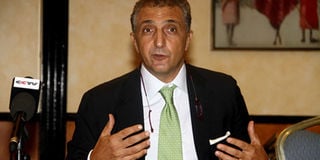Don’t lose sleep over inflation, IMF advises the Central Bank

Mr Domenico Fanizza of the International Monetary Fund (IMF). He said the jump in the national inflation, which hit a 15-month high of 8.29 per cent in September, is a result of the VAT Act and should not affect the country’s economic policy unless it persists. PHOTO|FILE.
What you need to know:
- The Central Bank’s monetary policy committee is set to hold its bimonthly meeting in November to review the country’s benchmark rate as a signal to the direction it wants the country economic growth should take.
- But to achieve the projected six per cent growth for this financial year, the fund said economic progression must remain in the range of 6 to 6.5 per cent in the last two quarters.
- The on-going fiscal decentralization provides an opportunity to improve accountability and the quality of service delivery .
The International Monetary Fund says last month’s spike in inflation in Kenya should not be a point of consideration by Central Bank when the latter meets to decide on how to steer economic growth.
Leading an International Monetary Fund mission to Nairobi, Mr Domenico Fanizza Wednesday said the jump in the national inflation, which hit a 15-month high of 8.29 per cent in September, is a result of the VAT Act and should not affect the country’s economic policy unless it persists.
The Central Bank’s monetary policy committee is set to hold its bimonthly meeting in November to review the country’s benchmark rate as a signal to the direction it wants the country economic growth should take.
The IMF mission has been in the country for two weeks conducting the sixth and last review of the three-year Extended Credit Facility approved in January 2011 to help the government’s economic reforms.
The team, held meetings with senior government officials including National Treasury secretary Henry Rotich and bank governor Njuguna Ndung’u.
It said economic reforms over the past three years have paid off, making the country more resilient to the global financial crisis and other external shocks.
“Budgetary discipline has helped ensure fiscal and external sustainability, while still providing sufficient resources to implement the new Constitution and start fiscal devolution,” Mr Fanizza said.
But to achieve the projected six per cent growth for this financial year, the fund said economic progression must remain in the range of 6 to 6.5 per cent in the last two quarters.
“This is realistic given that the country received ample rainfall so agriculture is expected to drive growth through the third and fourth quarters.
With the new government now settled in office, the economy is bound to benefit from increased public spending,” IMF resident representative Ragnar Gudmundsson said.
The team also called for a fiscal policy that focuses on increased efficiency and quality of public spending.
The on-going fiscal decentralization provides an opportunity to improve accountability and the quality of service delivery but its success will depend on building capacity at the county level, they said.





